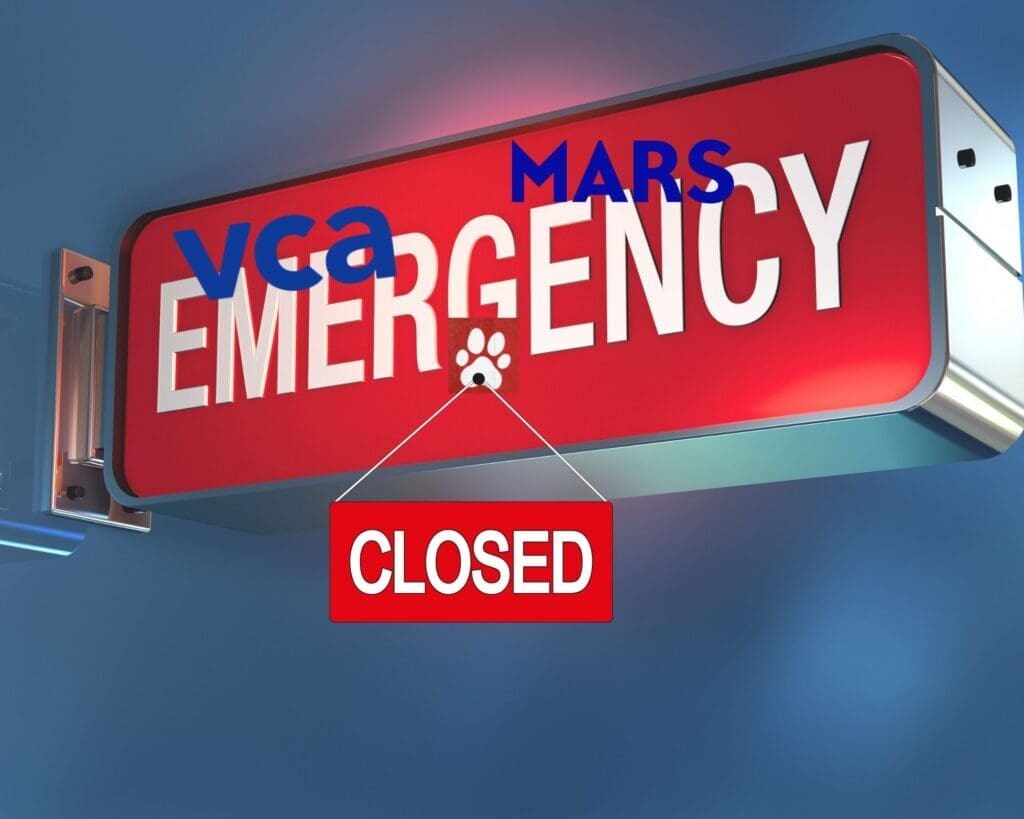Update: Candy Company Owned Katonah Bedford Vet Closures Persist
Cost-cutting initiatives seem to be coming from the top.
The now VCA-owned Katonah Bedford Veterinary Center, a pioneer in the profession whose founding was chronicled in a 2001 New York Times profile, was closed again this past weekend for a third time. Before August 1, 2025, the hospital had never shut its doors in its nearly 25 years of operation.
As we reported earlier this month, hospital staff who asked not to be identified told TCR that two VCA regional managers ordered a region-wide 33% pay cut – from $300/hour to $200/hour – to emergency veterinarians working per diem shifts. This reduced pay in relief veterinary wages, according to hospital staff, was the reason the hospital was forced to close.
A Secret Pay Increase?
As our first story was going to press, we learned that following our initial inquiries about the Katonah Bedford VCA facility, the two VCA managers – Joseph Beck and Dr. Scott Shaw (both declined comment) – who had directed the pay cuts, impacting veterinary hospitals as far away as New Hampshire and Massachusetts – had quietly authorized KBVC hospital director Meghan Harrison to re-increase per diem wages for ER vets from $200 to $300/hour. But there was an important caveat: The pay increase would need to be kept a secret. Relief veterinary workers would need to be re-recruited verbally, according to staffers. The change in pay rate would not and could not be publicized on the hospital’s career site, or in any job ads, the managers told hospital staff, to avoid alerting and angering staff at other regional VCA hospitals – where wages were also cut, and have not been restored.
For now, no other VCA hospital in the northeast has been forced to close as a result of the wage cuts that we are aware of. (If any readers know of any, please tell us!) However, nearly all 24/7 hospitals with the exception of Katonah Bedford – until now – have closed or been forced to cut hours in recent years, including VCA in Westbury, Long Island, VCA in Concord, NH and VCA Shoreline in Connecticut.
VCA’s Response
“VCA regularly and carefully review[s] our packages, with a view to market conditions that balance our commitment to providing care in a sustainable way across all our hospitals,” spokesman Joseph Campbell said in an email, addressing questions about the pay cut directive. “We continue to work on ways that ensure reliable care coverage for the community, including actively recruiting for an ER doctor to join the Katonah Bedford team permanently. It’s important to know that there is ongoing work underway to support the Katonah Bedford team and the pets they serve.”
The hospital was acquired by VCA in 2011. VCA’s network now includes over 4,500 veterinarians working at over 1,000 general practice, specialty and emergency veterinary hospitals spanning the United States, Canada, and Japan, according to parent company Mars’s website.
Mr. Campbell, the spokesman, first made no mention of the regional cost cutting directive and instead initially pointed to a Mars-commissioned study offering data, showing, he said, that the culprit was a national shortage of veterinary professionals. However, the Mars paper is an analysis the American Veterinary Medical Association (AVMA) disputes in a study the vet trade group commissioned. “No Dire Shortage of Veterinarians Anticipated” the Journal of the American Veterinary Medical Association (JAVMA) headlined in a brief discussing the findings.
Texas veterinarian and co-owner of a 24/7/365 hospital in Frisco, Texas Dr. Mike LoSasso, chastised Mr. Campbell’s explanation on LinkedIn, calling it “bullshit”:
“They cut the salary for overnight veterinarians, but blame the problem on a “nationwide shortage of veterinarians.” This is the less-than-completely-honest rhetoric the public has come to expect from corporations that own these hospitals, including VCA. In other news, Mars announced a $2B investment in a new US candy manufacturing plant. Working overnights is brutally hard on your body – I’ve done it for more than 2 decades….Mars has the money to keep it open, but the really expensive VCA hospitals are suffering everywhere due to their exorbitant pricing. I have no sympathy for the corporations, but there are some good doctors that are trapped by their non-compete clauses (and you better believe that corporations with deep pockets will pursue the enforcement of such).
I’m just saying that blaming this on the “shortage” is bullshit,” he concluded.
Mars Layoffs
In November 2024, Mars, the maker of M&M’s and Snicker; also VCA’s parent company, implemented large scale reductions in force at the company’s U.S. and U.K. divisions. One of the individuals swept up in the layoffs included veterinary oncologist and researcher Dr. Philip Bergman, whom Dr. Alan Green, KBVC’s founder, famously poached from the Animal Medical Center.
Asked for comment, Dr. Bergman’s former boss at KBVC, Dr. Green, wrote in a text:
“How the hell do you fire a Phil Bergman?” Dr. Green said. “I used to be so proud to put his name on a speaking engagement,” Dr. Green added. Before Dr. Green poached Dr. Bergman in 2007, he led the cancer service at the preeminent Manhattan nonprofit teaching hospital, AMC.
After VCA acquired KBVC, several prominent specialists who are now giants in their fields – like surgeon Rob Hart – departed for AMC – but a few remained in place even after Mars acquired VCA, including Philip Bergman, who led all clinical research for VCA while continuing to practice as an oncologist at VCA Katonah Bedford. When Mars acquired VCA, Dr. Bergman became chief clinical director for all of Mars Veterinary, whose subsidiaries include a laundry list of popular pet food brands as well as veterinary hospital networks such as BluePearl and Banfield. Among other achievements, Dr. Bergman spearheaded the now widely used canine melanoma vaccine, Oncept. He is even an adjunct faculty member at Memorial Sloane-Kettering. That may be why the marketing videos on the Mars website featuring Dr. Bergman have remained online.
“It broke my heart and my mind to be laid off and have to leave my patients and owners. It hit me so hard I hired a shrink for the first time as I had suicide ideation,” Dr. Bergman told TCR.
Dog, Interrupted
Arielle Whitman of Greenwich, CT told TCR in an interview that she brought her 11 year-old mixed breed pup Scooby to Dr. Bergman in 2024 for treatment of two types of cancer, describing the moment when she learned Dr. Bergman had been laid off last fall while she was midway through Scooby’s cancer treatment. Scooby is pictured here:

 “Our dog was in active treatment,” Ms. Whitman told TCR. “We had appointments scheduled out until March because it’s so hard to get appointments with him. “In early November, he told us he had been laid off. He would not be there after January 1st…We had to scurry around looking for an oncologist.”
“Our dog was in active treatment,” Ms. Whitman told TCR. “We had appointments scheduled out until March because it’s so hard to get appointments with him. “In early November, he told us he had been laid off. He would not be there after January 1st…We had to scurry around looking for an oncologist.”
Ms. Whitman says Dr. Bergman went out of his way to assist her with the search. She says she’s forever grateful to Dr. Bergman, but remains “disgusted” with Mars and VCA for their treatment of her hero veterinarian.
“If you are running a professional institution, you don’t lay off people like that, especially in the way that they did. It was horrible.”
She added: “Somehow, we found an oncologist who ended up taking us on, and Dr. Bergman, thank God for him, figured out a way to transfer us [to a new oncologist and who could continue Dr. Bergman’s treatment protocol].”
Related:
Pioneering NY Vet Hospital Shutters for First Time in 24 Year Run


